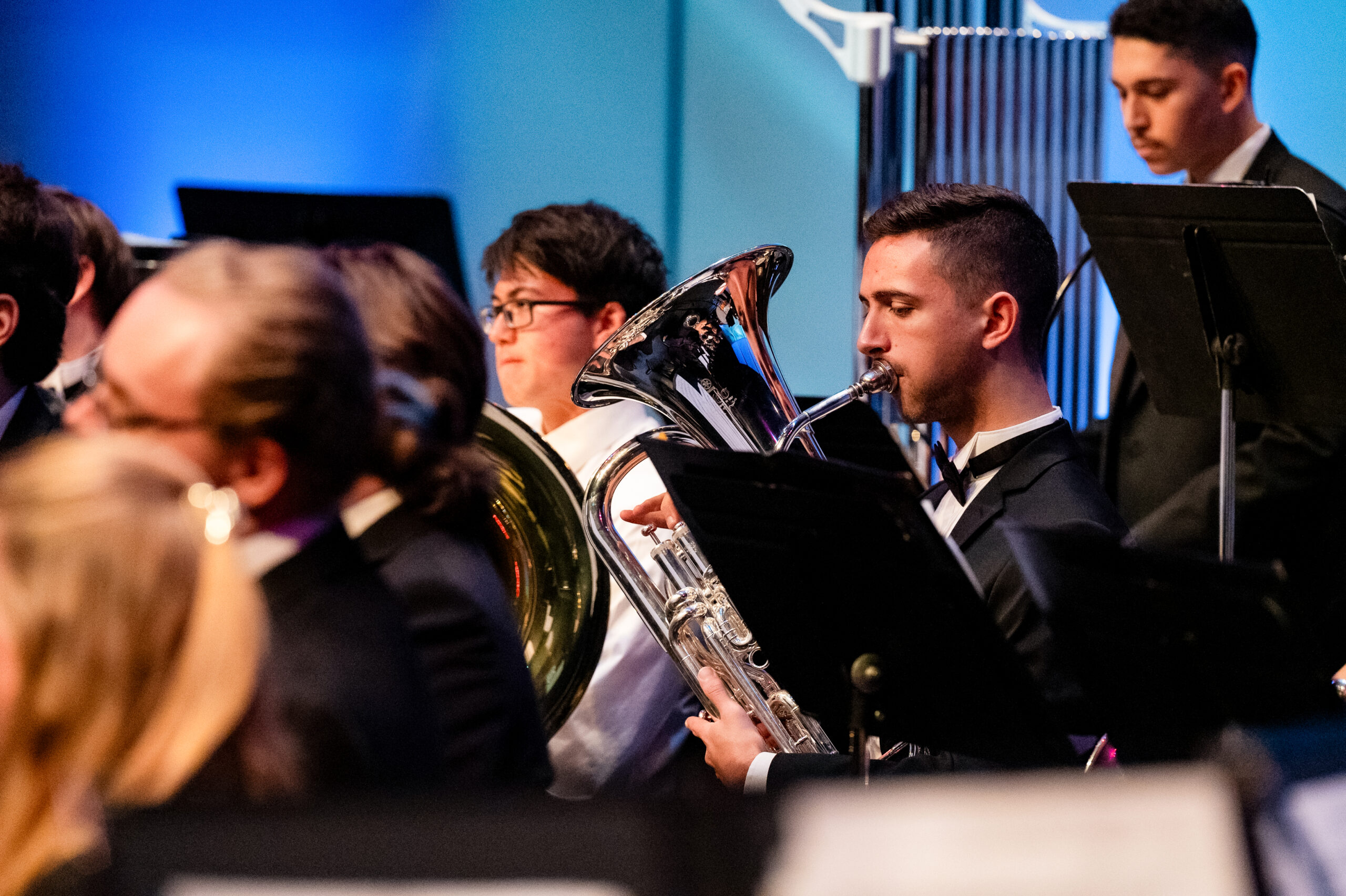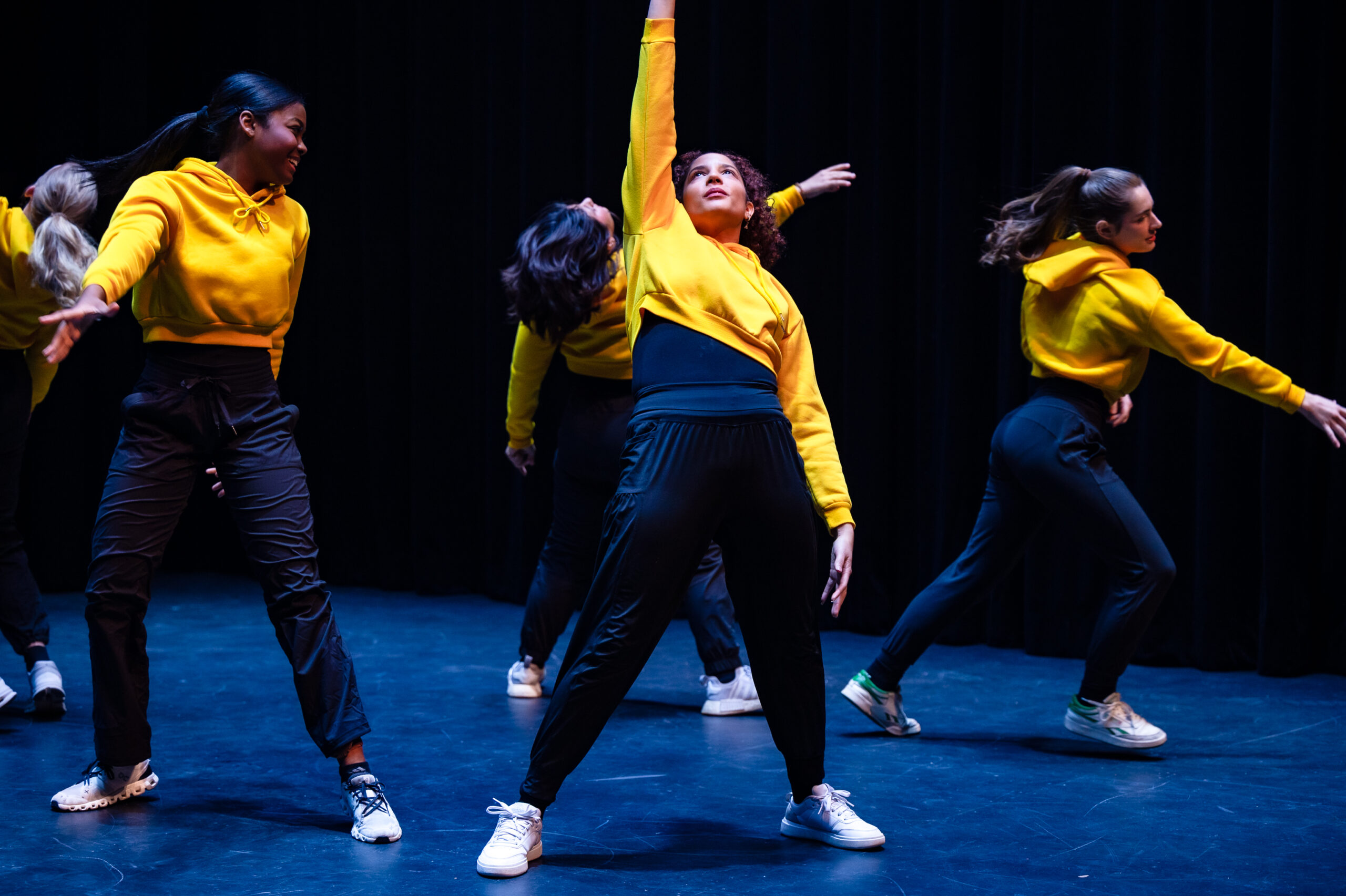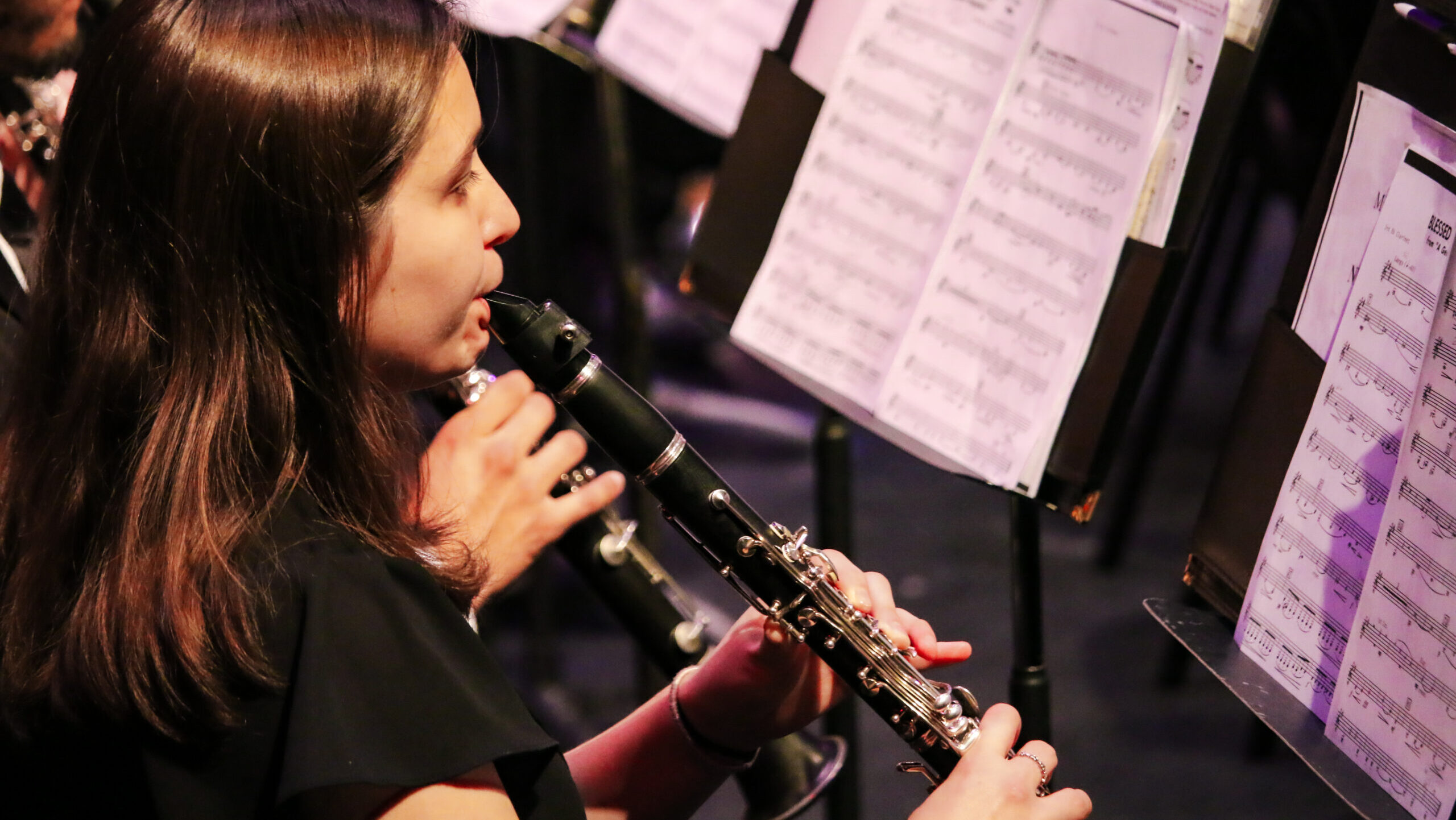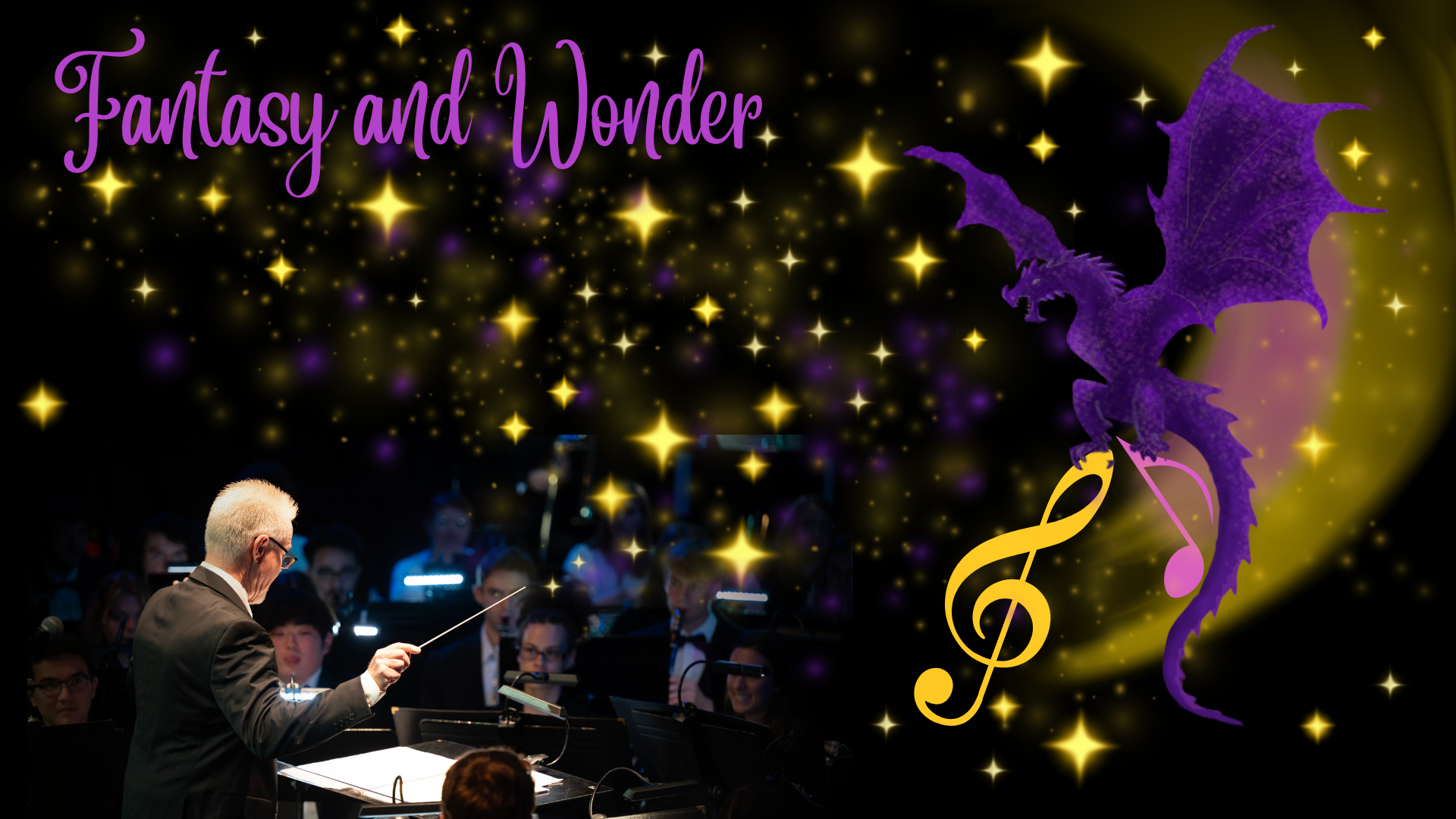Wind Ensemble Spring Concert
February 26, 2025
7:30 p.m.
Stewart Theatre

The NC State Department of
Performing Arts and Technology
presents
The NC State
Wind Ensemble
Directed By
Paul Garcia
PERFORMANCE OVERVIEW
Jump to a specific spot in the program.
PROGRAM
| Bach’s Fugue a la Gigue |
CREDITS
Johann Sebastian Bach
Trans. By Gustav Holst
MORE INFO
When Holst was commissioned to write Hammersmith for the BBC Wireless Military Band in 1928, he felt rather out of practice in orchestrating for the medium. For some years he had the idea of arranging some JS Bach fugues for brass and military band, so he set himself the task of scoring the Organ Fugue in G Major BWV 577 (from Preludes, Fugues and Fantasias). He, rather than Bach, called it Fugue à La Gigue.
The piece made an ideal exercise, and Holst’s brilliant dovetailing of the counterpoint between different instruments shows his mastery. The piece is technically demanding and the characteristic unison clarinet writing suggests the orchestral conception of a large wind ensemble rather than a band. It was this concept which the composer carried forward into Hammersmith.
Fugue à La Gigue was published for military band in 1928 by Boosey & Hawkes and shortly afterwards for orchestra, but with only short scores, as was customary at the time.
| Equus |
CREDITS
Eric Whitacre
NOTE FROM THE COMPOSER
At the Midwest Band and Orchestra convention in 1996, Gary Green approached me about a possible commission for his wind ensemble at the University of Miami. I accepted, and the commission formally began July 1st, 1997. Two years later I still couldn’t show him a single note. That’s not to say I hadn’t written anything. On the contrary, I had about 100 pages of material for three different pieces, but I wanted to give Gary something very special and just couldn’t find that perfect spark.
Around this time my great friend and fellow Juilliard composer Steven Bryant was visiting me in Los Angeles, and as I had just bought a new computer I was throwing out old sequencer files, most of them sketches and improvisational ideas. As I played one section Steve dashed into the room and the following conversation ensued:
Steve: “What the hell was that!?!”
Me: “Just an old idea I’m about to trash.”
Steve: “Mark my words, If you don’t use that I’m stealing it.”
The gauntlet had been thrown.
That was the spark, but it took me a full eight months to write the piece. There are a LOT of notes, and I put everyone on paper (with pencil). I wanted to write a moto perpetuo, a piece that starts running and never stops (‘equus’ is the Latin word for horse) and would also be a virtuosic show piece for winds.
The final result is something that I call “dynamic minimalism,” which basically means that I love to employ repetitive patterns as long as they don’t get boring. We finally premiered the piece in March 2000, nearly three years after the original commission date, and the University of Miami Wind Ensemble played the bejeezus out of it. Equus is dedicated to my friend Gary Green, the most passionate and patient conductor I know.
| NC State Woodwind Quintet |
| Bläserquintett Es-Dur (Wind quintet in E flat Major) II. (Scherzo) III. (Andante grazioso) |
CREDITS
Anton Reicha
Performers
Reece Neff
Megan Vezzetti
Cameron Kellner
Erika Fetvedt
Jacob Timin
| NC State Trombone Octet |
| Salvation is Created |
CREDITS
Pavel Cheznokov
arr. C. De Paolo
Performers
Ben Poovey
Max Abelson
Jack Fitzpatrick
Zack Powers
Harrison Fringer
Luke Sbityakov
Liam Weiss
Spencer Monaco
Samer Issa (NC State alumni)
| Full Tilt |
CREDITS
Anthony DiLorenzo
| City Trees |
CREDITS
Michael Markowski
NOTE FROM THE COMPOSER
I had just moved from Arizona to New York City when I began sketching the first fragments of City Trees. After being born, growing up, and living in the desert for 25 years of my life, moving to New York so suddenly was and continues to be one of the most challenging things I’ve ever done. I think it has also been one of the bravest. I left my friends, my family, and my ridiculously cheap rent all without much planning.
Every time I walk down a street in New York, I notice the trees shackled by the sidewalk. Some have little fences around them, many have trash nestled up next to their exposed roots, and others have grown so big and become so strong that they have broken right through the concrete pavement. As I pass beneath them, they all seem to wave their leafy pom-poms in the wind, a thousand leaves applauding, cheering me on as if I had just returned from the moon.
These trees have learned how to brave the concrete jungle, and it gave me solace knowing that they had flourished in such a challenging environment. Over time, the impossibilities of the city have become familiar, and although I continue to learn new lessons every day, I’ve slowly begun to assimilate, finding my way around, discovering new places, and making friends while still keeping close with those who aren’t close by. The music in City Trees began to take on a growing sense of perseverance, embodied by the expansive melodies that sweep over the pensive, rhythmic undercurrent.
For me, City Trees is a reflection of the bravery that it often takes to venture into new worlds, embrace other cultures, and lovingly encourage new ideas. I am deeply honored to dedicate this piece to the Lesbian and Gay Band Association. Although I may never completely understand the unique challenges my friends have faced and had to overcome, I am inspired by the overwhelming courage that has been so firmly planted for 30 years and that continues to grow, perhaps slowly, but always stronger.
| The Universal Judgement |
CREDITS
Camille de Nardis
Arr. Antonia Cafarella
MORE INFO
Composed in 1878, The Universal Judgement won 1st Prize in a national band competition in Naples, Italy. Camille de Nardis was 21 years old when he composed this work. It is one of the earliest compositions written specifically for band.
The “universal judgement” refers to the end times when God brings judgement on humanity. The beginning tempo marking is “Allegro con fuoco” meaning “fast with fire”. It opens with turbulent low winds and brass announcing the imminent coming judgement. Towards the middle of the piece, a powerful call and response section, featuring the trumpets and low brass, represents a glimpse of the ranks of angels blowing the last fanfare signaling that the time of the final judgement has arrived.
“The Universal Judgement” is completely nineteenth-century Italian opera in nature, style, and scope. You can hear similarities to the well known “Tuba Mirum” section of Verdi’s requiem, which was premiered in Milan, Italy in 1874. Four years before de Nardis composed his own “universal judgement”.
Camille de Nardis was a very successful composer of operas and symphonic works for orchestra and band. He taught at several universities in Italy and was named director of the Conservatory of Naples, Italy where he taught composition held the director position for over twenty years.
MEET THE PERFORMERS
NC State Wind Ensemble
Flutes
AJ Magistrado (co-principle)
Kate Sullivan (co-principle)
Rebecca Moore
Evan Yun
Ellie Murray
Caitlin Potter
Bailey Dugan
Annamarie Cheek
Mackenzie Phillips
Oboes
Megan Vezzetti
Cameron Kellner
Clarinets
Jordan Eilers
Jacob Timin
Claire Siegel
Sela Bettoli
Pen Hunter
Mitchell Sefton
Zachary Dodson
Faith Richards
Lizzie Rappaport
Emmie Cumby
Jake Bates
Bassoons
Ryan Gibson
Erika Fetvedt
Bass Clarinets
Jake Bramhall
Emily Dodson
E Chapman
Saxes
Seth Olanovich – Alto 1
Nathaniel Baird – Alto 1
Julia Gale – Alto 2
Nate Robison – Alto 2
Jack Fulp – Tenor
Katherine Fowler – Tenor
Matt Cash – Bari
Ethan Newhouse – Bari
Horns
Alex Troutman
Catherine Farnham
Trevor Petzold
Erik Svanes
Christopher MacKay
Emily Cox
Johan Catlin
Trumpets
Owen Forbes
Eiad Yakout
Srikar Desemsetti
Nick Novelli
James Rhile
Eelco Tinga
Virginia Griffith
Avery Vega
Trombone
Max Abelson
Ben Poovey
Jack Fitzpatrick
Luke Sbityakov
Liam Weiss
Euphoniums
Daniel Bailey
Matthew Pearce
Jonathan Jenkins
Tuba
Rico Abelson
Tyler Smith
Scott Elliott
Payton Wurst
Luke Ryan
Percussion
Jason Fogelsonger
Emma Hamrick
Elizabeth Ingram
Zeiad Yakout
Casey Griffin
Karl Shroff
Vadin Ha
Liam Courtright
Bodey Good
Piano
Elaine Wolochuk
Woodwind Quintet
Reece Neff
Megan Vezzetti
Cameron Kellner
Erika Fetvedt
Jacob Timin
Trombone Octet
* indicates NC State Alumni
Ben Poovey
Max Abelson
Jack Fitzpatrick
Zack Powers
Harrison Fringer
Luke Sbityakov
Liam Weiss
Spencer Monaco
Samer Issa*
MORE FROM THE DEPARTMENT
ATTEND ANOTHER CONCERT BAND PERFORMANCE
- Categories:


